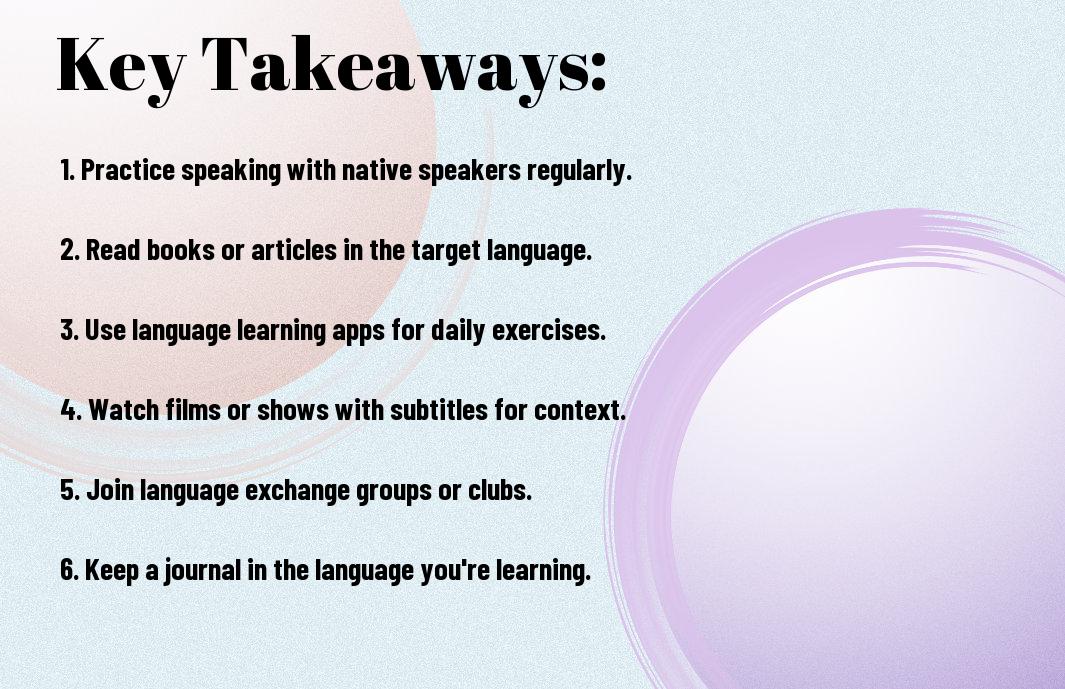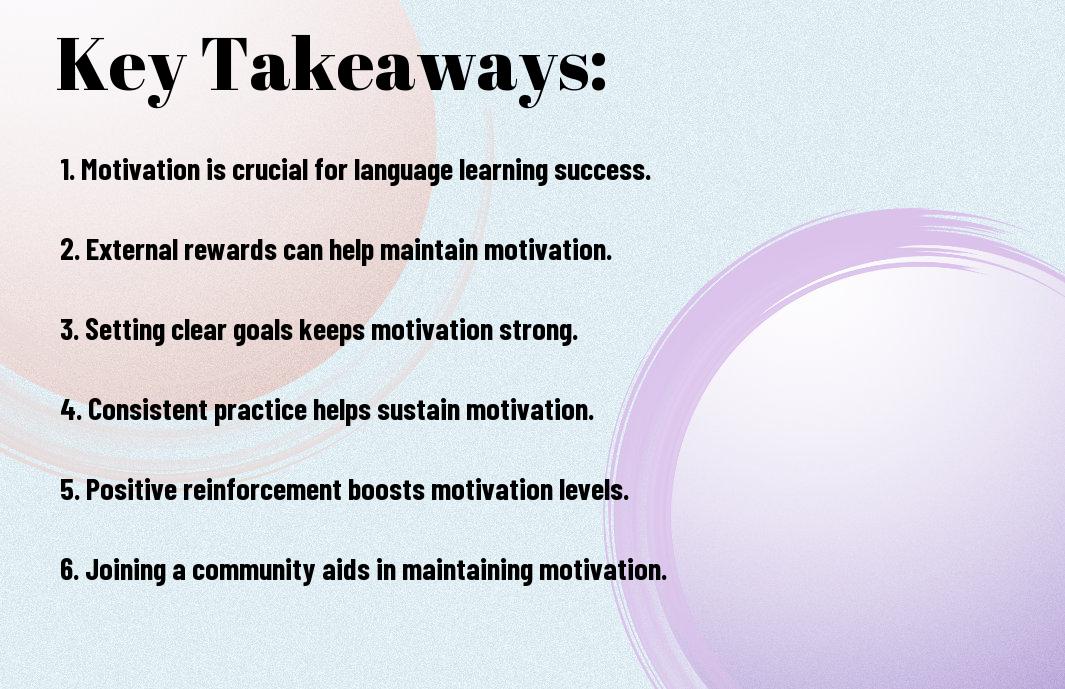As you continue to learn and use a new language, you may find that your skills can fade if not consistently practiced. Your ability to speak, write, and understand can become rusty, making it difficult to communicate effectively. You will need to make a conscious effort to maintain your language skills, and this article will guide you through the process, providing you with practical tips and strategies to keep your language skills sharp and effective over time, ensuring you can express yourself with clarity and precision.
Key Takeaways:
To maintain language proficiency over time, consider the following points:
- Engage in regular practice by setting aside time each day or week to speak, write, or listen to the target language, which helps to prevent language erosion.
- Immerse yourself in authentic materials such as books, movies, and news in the target language to stay up-to-date with modern expressions and vocabulary.
- Seek out language exchange opportunities with native speakers or fellow learners to practice conversational skills and receive feedback on pronunciation and grammar.

Maintaining Vocabulary
The key to maintaining vocabulary is consistent practice and exposure to new words. You can achieve this by incorporating vocabulary-building activities into your daily routine, such as reading and learning new words, using flashcards, and utilizing language learning apps.
Reading and Learning New Words
Besides being an enjoyable activity, reading is an effective way to learn new words and expand your vocabulary. You can start by reading books, articles, and news in the language you want to maintain, and make a note of unfamiliar words to look up later.
Using Flashcards and Language Learning Apps
Among the various tools available to help you maintain vocabulary, flashcards and language learning apps are particularly useful. You can use them to quiz yourself on new words, track your progress, and stay motivated to continue learning.
Hence, as you explore the world of flashcards and language learning apps, you will find that they offer a range of features to help you maintain your vocabulary. You can create digital flashcards, play word games, and even engage in conversations with native speakers, all of which will help you to stay engaged and committed to maintaining your language skills over time.

Improving Grammar and Sentence Structure
Any attempt to improve your language skills must begin with a focus on grammar and sentence structure. You will find that mastering these fundamentals is crucial to effective communication, and will serve as the foundation upon which your language skills are built.
Practicing Writing and Speaking
Prior to developing a strong command of language, you must practice writing and speaking regularly. You will need to write and speak as much as possible, using your language skills in context to reinforce your learning and identify areas for improvement.
Focusing on Clarity and Conciseness
Similar to speaking, your writing should prioritize clarity and conciseness. You should strive to convey your ideas in a straightforward and efficient manner, avoiding unnecessary complexity and jargon that can confuse your audience.
Even as you focus on clarity and conciseness, you will need to balance simplicity with nuance and depth. You can achieve this by varying your sentence structure and using vocabulary that is precise and evocative, allowing you to convey subtle shades of meaning and tone in your writing and speaking.
Staying Engaged with Language
Many language learners find that staying engaged with the language is key to keeping their skills sharp. You can achieve this by incorporating the language into your daily routine, whether through reading, writing, or speaking.
Watching Movies and TV Shows in the Target Language
Above all, watching movies and TV shows in the target language can be a great way to stay engaged. You can start with subtitles in your native language and gradually switch to subtitles in the target language as you become more comfortable.
Listening to Music and Podcasts
The most effective way to improve your listening skills is to listen to music and podcasts in the target language. You can find a wide range of podcasts on various topics, from news to entertainment, and music in different genres.
Language learning through music and podcasts can be particularly helpful as you can listen to them during your daily commute or while doing chores. You can also try to sing along to your favorite songs or summarize the main points of a podcast episode to reinforce your understanding of the language and improve your pronunciation and comprehension skills.
Overcoming Language Barriers
Your ability to overcome language barriers will depend on your willingness to practice and immerse yourself in the language. You must be proactive in seeking out opportunities to engage with native speakers and use the language in real-life situations.
Finding Language Exchange Partners
Around every corner, there are opportunities to find language exchange partners, whether through local language meetups or online platforms. You can search for people who share your interest in language learning and practice with them regularly.
Using Online Resources and Language Learning Communities
Beside the numerous language learning apps and websites, there are many online communities dedicated to language learners. You can join these communities to connect with other learners, get feedback on your language skills, and stay motivated.
Due to the vast array of online resources available, you can access language learning materials and practice with native speakers from the comfort of your own home. You can use online platforms to take language courses, watch videos, and engage in conversations with others, all of which will help you to improve your language skills over time.
Setting Goals and Tracking Progress
Despite the challenges of maintaining language skills, you can stay on track by setting achievable goals. You can find inspiration on how to do this by visiting How do polyglots maintain their knowledge over time? to learn from experienced language learners.
Creating a Language Learning Schedule
Above all, your schedule should be realistic and tailored to your needs. You should allocate specific times for language practice, whether it’s reading, writing, or speaking, to ensure consistent progress.
Monitoring Progress and Adjusting Goals
Learning to assess your own progress is vital. You will need to evaluate your language skills regularly to identify areas that require improvement and adjust your goals accordingly.
Adjusting your approach as you learn is a normal part of the process. As you monitor your progress, you will identify what works best for you and what doesn’t, allowing you to make informed decisions about your language learning journey and make adjustments to stay on track and achieve your goals.
Staying Motivated
Unlike many other skills, language skills can be maintained with consistent practice. You can find helpful tips on how to keep your language skills sharp and stay motivated to continue learning.
Finding Language Learning Buddies
Alike many learners, you will find that having a language learning buddy can be beneficial in staying motivated and engaged in the learning process.
Rewarding Yourself for Achievements
Besides the sense of accomplishment, you can reward yourself for achieving your language learning goals, which will help you stay motivated and encouraged to continue.
This approach will help you to create a positive association with language learning and make the process more enjoyable, as you will have something to look forward to after reaching your milestones, and you will be able to track your progress and celebrate your successes.
To wrap up
On the whole, you have now acquired the necessary tools to maintain your language skills over time. By applying these methods consistently, you will be able to improve your proficiency and keep your language sharp. Your dedication to practicing regularly and seeking out new challenges will ultimately determine your success, so stay committed and you will see lasting results in your language abilities.
FAQ
Q: What are the most effective ways to maintain language skills over an extended period?
A: To keep language skills sharp, it’s vital to practice consistently. This can involve activities such as reading books or articles in the target language, engaging in conversations with native speakers, watching TV shows or movies without subtitles, and using language learning apps that offer interactive exercises and quizzes. Setting aside a specific time each day for language practice helps in maintaining and improving skills over time.
Q: How can I stay motivated to continue practicing a language when I’m not actively using it in my daily life?
A: Staying motivated involves setting achievable goals, whether it’s improving vocabulary, enhancing comprehension, or mastering a specific dialect. Finding a language learning buddy or joining a language exchange community can provide additional motivation, as it allows for social interaction and exchange. Moreover, celebrating small milestones and rewarding oneself for progress made can help maintain enthusiasm and commitment to the learning process.
Q: Are there any specific activities that can help in sharpening both speaking and listening skills simultaneously?
A: Yes, activities like listening to podcasts or audiobooks in the target language and then summarizing what was heard can significantly improve both speaking and listening skills. Another effective method is to engage in role-playing scenarios, either with a language exchange partner or solo, where one speaks based on a prompt or scenario. Recording oneself and then listening to the recording to identify areas for improvement is also a valuable technique for enhancing both speaking and listening abilities.




